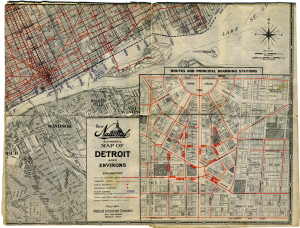Difference between revisions of "The Stars Are Right: The Irish Rose"
FrankLovejoy (talk | contribs) (→Detroit Evening Times) |
FrankLovejoy (talk | contribs) (→Detroit Evening Times) |
||
| Line 54: | Line 54: | ||
* [[TheStarsAreRight:TheIrishRose:Article9 | White Slavery in the Motor City!]] - August 16, 1932 | * [[TheStarsAreRight:TheIrishRose:Article9 | White Slavery in the Motor City!]] - August 16, 1932 | ||
* [[TheStarsAreRight:TheIrishRose:Article10 | Heroic Doctor Speaks]] - August 17, 1932 | * [[TheStarsAreRight:TheIrishRose:Article10 | Heroic Doctor Speaks]] - August 17, 1932 | ||
| − | * [[Article1]] | + | * [[TheIrishRose:Article1]] |
Revision as of 19:24, 12 June 2013
Return to Main Page
This campaign started as a new group in 2012, although several players had played in other campaigns in the world.
Set in Detroit in 1932 - our oddly matched group of characters continue to balance gangsters, a mysterious medical condition, an odd preacher and his sister and a state hospital scandal - all in an effort to figure out the complicated workings of the under classes.
Contents
Detroit in 1932
Detroit - like all of urban America - reels under the crushing grip of the Great Depression. With the crash of the stock market in February 1930, the economy has been in a progressive tail-spin.
The largest employers in the area - the automobile manufacturers - have been hardest hit. Ford, Cadillac, Fisher, Buick, Packard, and the Detroit Electric Car Company have all curtailed production and let go thousands of workers. Auto factory jobs once thought to be a life-time guarantee of employment, have sadly become run by mere skeleton crews.
Now, two years into the crisis, with production of goods at a stand still, in a city of approximately 1.5 million people, over 225,000 are unemployed. Men who are unmarried have an easier time of it - they have no wives or children to worry about. Those who are married struggle on as best they can - knowing that each day without a job means another day they must find some method to feed the ones they care for.
There are a few rays of hope. The Mayor's Commission provides boxes of apples for men to sell on the street corners at 5 cents per apple. The Capuchin Monks feed 800 per day through the Catholic churches. The idle Fisher Auto Factory has become the City Municipal Lodging House, with heat, lights, showers, and meals for unmarried men - provided by donations from the Fisher brothers. The White Towers restaurants serve free lunches once a month.
Clark Park has been set up as an emergency camp for evicted families. Private citizens and the National Guard have donated tents. The women have created sewing circles, while the children used the playgrounds and the men looked for work. Thrift Gardens have been planted along the outskirts to help with feeding the poverty-stricken. Physicians donate free medical care under the auspices of the Medical Relief Committee.
For those who have a few coins to rub together, prohibition is playing out its last gasp the best way it knows how - by letting the liquor flow through thousands and thousands of bars and taverns. Most operate openly with little interference from the police, serving up a mixture of poor grade liquor, gambling, worn and desperate women - and if a high class joint - a piano player working for tips.
Characters
World History
Russia
Communist revolution overthrew Tsarist regime in 1917 and Russian nobility fled into exile in rest of Europe. Alexis Romanoff came out of hiding in early 1930, and was legitimated by Russian Court in exile and head of Russian Orthodox Church. Married Countess Ineska Rulionoff in February 1932, and headed into Russia in company of someone named Alexey Vishnevski shortly thereafter. Russia further cut itself off from international community, but rumors of civil war, unrest, etc. trickled out. The new Tsarist regime was proclaimed last month, with Tsar Alexis retaining the reforms of Nicholas II. The communists have fled the country.
Britain and France have recognized the new government, with Hitler's Germany and the USA holding off.
Timeline
Detroit Evening Times
131 Bagley Street
Purchased by William Randolph Hearst in 1921, the Times is the fastest growing paper in the city. The following articles appeared in August, 1932.
- Saloonkeeper Slain As Gang War Erupts - August 5, 1932
- Irish Rose Medico A Mystery - August 6, 1932
- Second "Doctor" In Rose Murder Identified - August 7, 1932
- Cream of Society Fills Rose While Gang War Brews - August 8, 1932
- Macklin's Girl Speaks - August 9, 1932
- Strange Incident at Curtisville Church - August 10, 1932
- Kansas City Connection Discovered in Irish Rose Murder - August 11, 1932
- International Connection Discovered in Irish Rose Murder - August 12, 1932
- White Slavery in the Motor City! - August 16, 1932
- Heroic Doctor Speaks - August 17, 1932
- TheIrishRose:Article1

